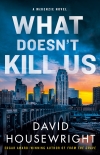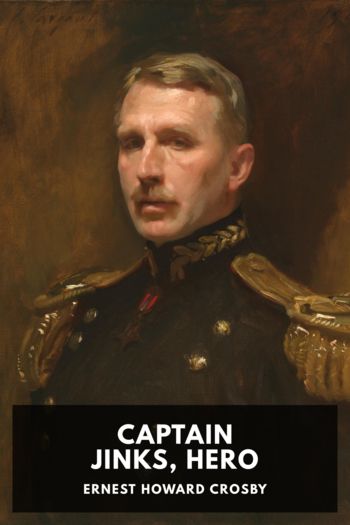What Doesn't Kill Us--A McKenzie Novel, David Housewright [best young adult book series .txt] 📗

- Author: David Housewright
Book online «What Doesn't Kill Us--A McKenzie Novel, David Housewright [best young adult book series .txt] 📗». Author David Housewright
Shipman traveled to the crime scene because Bobby had said, “Everybody,” and she didn’t want him to think that my getting shot wasn’t worth her undivided attention even though she had way better things to do with her time. The first thing she did was debrief Gafford, who told her that he had been unable to locate a single witness who saw the shooting besides Nancy Moosbrugger. Or at least no witnesses who were willing to discuss the matter with a member of the law enforcement community.
“McKenzie couldn’t get shot in Macalester-Groveland,” Shipman said. “No, it’s gotta be on Rice Street.”
“Well, this part of Rice Street, anyway. The rest of the street isn’t…”
Gafford stopped speaking because of the withering look Shipman gave him, the one that asked, “Are you contradicting me?”
Gafford told Shipman that he had been able to identify the car I drove—a Jeep Cherokee parked up the street. Shipman quickly ordered it towed to the SPPD’s impound lot, where I would eventually need to provide proof of ownership, a valid driver’s license, proof of insurance, and a credit card to pay all towing and storage fees—no personal checks—in order to recover it. Don’t think for a second that the expense and inconvenience it would cause me didn’t cross her mind, either.
Shipman dismissed Gafford and made her way toward RT’s Basement, making sure to step around the bloodstain. While on her way, she was intercepted by a tech working out of the FSU.
“Hey, sexy,” he said.
“Sexy?”
Shipman glanced down at herself almost in self-defense. She was wearing what she nearly always wore on the job, jeans, button-down shirt, and a blazer long enough to conceal the Glock she wore on her hip.
“Everyone knows you’re the best-looking woman on the force,” the tech said.
“Brian, should I bring you up on harassment charges or just shoot you myself?”
The tech raised a clear six-by-nine-inch polyethylene evidence bag with a white write-on area that had already been filled out for Shipman to see. He was smiling like he had the winning ticket for the Daily Three. Shipman stared at the bag. It looked empty to her.
“What am I looking at?” she asked.
“Spent cartridge,” the tech answered.
That’s when Shipman saw the half-inch long brass case resting at the bottom of the bag.
“Thirty-two ACP,” Brian said. “Which means semiautomatic; a wheel gun wouldn’t have tossed it. Which means a pocket gun; the damn thing would fit in the palm of your hand. Which means amateur. I mean think about it. President McKinley was shot twice, once in the abdomen by a .32, only it wasn’t that bullet that killed him. It was the gangrene.”
“Write it up,” Shipman said.
“What? You’re not going to give me some love, Jean? You guys from homicide, we solve eighty percent of your cases for you yet you never give us any love.”
“Do you know who shot the vic?”
“No, but…”
“Write it up, Brian. And don’t call me Jean.”
RT’s Basement promoted itself as a no-frills bar and lounge with live music Wednesday through Saturday, the music leaning toward hip-hop and R&B with a smattering of the blues. Shipman stepped inside the joint which, despite its name, was not located in a basement; she didn’t know if it even had a basement. She did see large windows facing the street and plenty of wooden tables, chairs, and booths facing an empty stage with huge speakers mounted on metal stands that were aimed at the tables, chairs, and booths. Most of them were occupied by people who were paying no attention whatsoever to what had been happening just outside the front door or to the flat-screen TVs mounted in the corners broadcasting what looked like post-game interviews with a couple of Los Angeles Lakers basketball players, the Lakers actually a Minneapolis team before it was moved in 1960, thus the name. Some of the people occupying the chairs and tables looked as if they were too young to drive much less drink.
A large black man was standing behind the bar. From his expression, Shipman decided he knew exactly who she was and what she wanted. She walked up to him while pulling a thin leather wallet from her pocket. She opened the wallet and gave the bartender a good look at its contents. Most people were impressed. The bartender glanced at the ID and badge and shook his head.
“Whaddya want?” he asked.
“What’s your name?”
He paused as if he didn’t want to give it out, finally said, “Richard Thomas.”
“Well, Dick…”
It was an old cop trick, using a suspect’s first name. It removes a suspect’s dignity and makes him feel defensive, inferior, and often dependent; it tells a suspect who’s in charge. Thomas had been around long enough to know that, though, and he didn’t let it bother him. It was the “Dick” that he objected to.
“People call me RT,” he said.
Shipman ignored him.
“The man who was shot—” she said.
“Are you guys just about done? I gotta business to run here.”
“Oh, are we in your way?”
“Whaddya think?”
“I think maybe I should start checking the IDs of some of your customers, what do you think, Dick?”
The bartender crossed his arms over his chest and waited.
“The man who was shot,” Shipman said. “What can you tell me about him?”
“Nothin’.”
“Nothing?”
“I hardly noticed him, like I told the other guy, Gifford.”
“Gafford.”
“My point,” RT said, “man comes in for a drink, pays for the drink, drinks the drink, leaves. Why should I pay any attention to him ’less he does somethin’ to, you know, attract my attention?”
“Like getting shot?”
“That happened outside. I didn’t even know it happened until someone told me and by then you people were here.”
“You people?”
“Police blockin’ my entrance and shit. I had to let people in and out through the back door in the alley.”
“Video cameras?”
RT shook his head.
“You don’t





Comments (0)